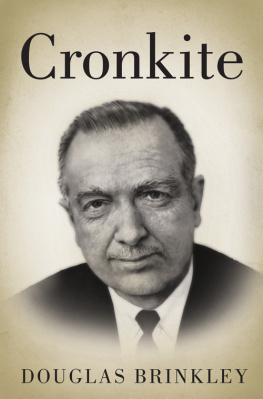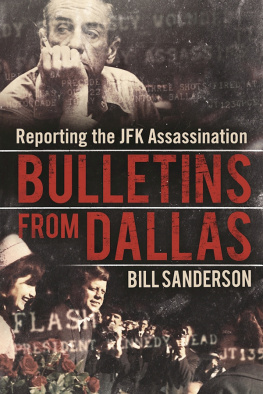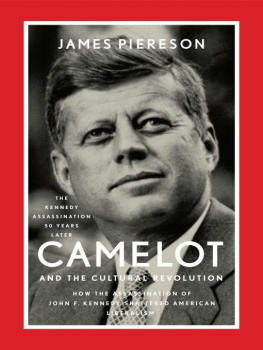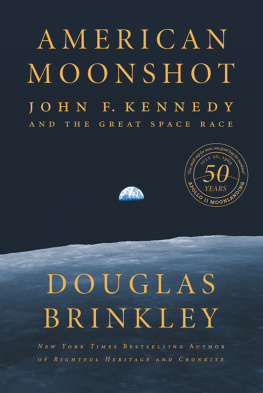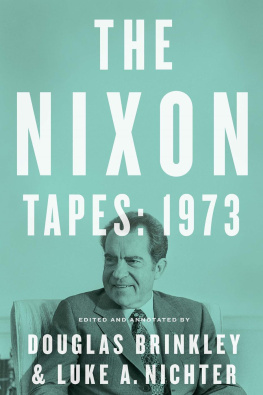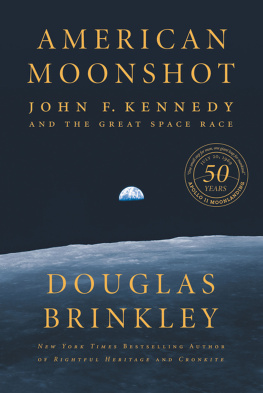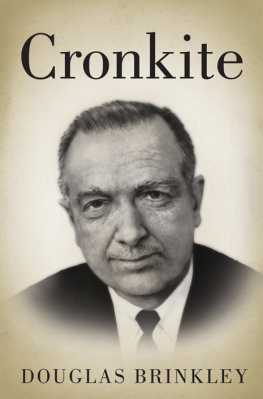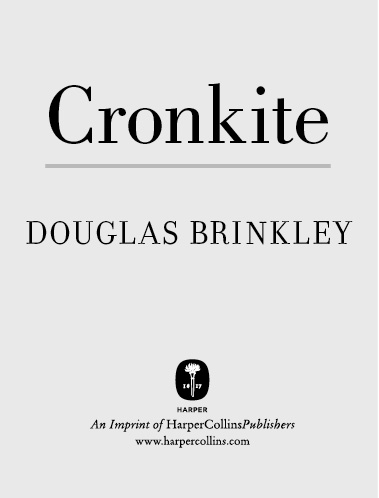
To Brian Lamb
and
David Halberstam
(19342007)
If we cannot produce a generation of journalistsor even a good handfulwho care enough about our world and our future to make journalism the great literature it can be, then professionally oriented programs are a waste of time. Without at least a hard core of articulate men, convinced that journalism today is perhaps the best means of interpreting and thereby preserving what little progress we have made toward freedom and self-respect over the years, without that tough-minded elite in our press, dedicated to concepts that are sensed and quietly understood, rather than learned in schoolswithout these men we might as well toss in the towel and admit that ours is a society too interested in comic strips and TV to consider revolution until it bangs on our front door in the dead of some quiet night when our guard is finally down and we no longer kid ourselves about being bearers of a great and decent dream.
HUNTER S. THOMPSON, The Proud Highway
The stalwart kingpin of CBS News... Walter Cronkite, who has earned for himself, and in turn for CBS that which we have wanted from the very start of our News Division: the highest degree of credibility in the world of journalism.... Walter has been so characterizedif not immortalizedwith the oft-heard line: If Walter says it, it must be so.
WILLIAM S. PALEY
When the history of journalism is written about our era, it will be divided into separate erasB.C. and A.C.before Walter Cronkite and after Walter Cronkite. And the great division here is that Walter had in spades what today is lacking in huge proportionand that is trust. Its probably hard for Walter himself to fathom how the profession of journalism has declined in public trust and, Im bound to say, public esteem since he left it. But the decline has been sharp and precipitous. In a profession, as with currency, its good to have a gold standard, and Walter is simply the gold standard of network, national, shared news experience.
G EORGE F . W ILL
C ONTENTS
The Making of a Reporter
/ Missouri Boy
/ Houston Youth
/ Learning a Trade
/ Making of a Unipresser
The Second World War
/ Gearing Up for Europe
/ The Writing Sixty-Ninth
/ Dean of the Air War
/ Gliding to V-E Day
/ From the Nuremberg Trials to Russia
Cold War Broadcaster
/ Infancy of TV News
/ Election Night and UNIVAC
/ Mr. CBS Utility Man
/ The Huntley and Brinkley Challenge
/ Torch Is Passed
/ New Space Frontier on CBS
Anchorman
/ Anchorman of Camelot
/ The Kennedy Assassination
/ Whos Afraid of the Nielsen Ratings?
/ Paleys Attempted Smackdown
/ Civil Rights and Project Gemini
/ What to Do About Vietnam?
/ The Tet Offensive
Top Game
/ Calm and Chaos of 1968
/ Mr. Moon Shot
/ Avatar of Earth Day
/ The Nixon-versus-CBS War
/ Reportable Truth in the Age of Nixon
/ Fan Clubs, Stalkers, and Political Good-byes
/ A Time to Heal
/ Live with Jimmy Carter
The Spokesperson
/ Retirement Blues
/ Struggling Elder Statesman
/ Defiant Liberal
/ The Worlds Oldest Reporter
/ The New Millennium
Electronic Uncle Sam
Walter Cronkitefor godsake, there are millions of people out there, 19, 20, 21, ridiculous ages like that, who think there has always been a Walter Cronkite. After the fashion of Franklin Roosevelt, Santa Claus, and the Easter Bunny. Every time there would be one of those great hulking Moments in History, an election, a national convention, a man in space, Kennedys assassination, there would be the face of Walter Cronkite on TV, with his hair combed straight back over his sagittal suture and his mustache spreading out like Melvyn Douglas after a good rousing heigh-ho afternoon at the St. Regis barbershop and his head tilted with him holding an earphone over one ear and then his voice coming out flue-cured Southern with the drawl trimmed off.
TOM WOLFE
W hen novelist Kurt Vonnegut heard that, on March 6, 1981, after nearly nineteen years of service, Walter Cronkite was retiring at sixty-four years old from his job as anchorman of the CBS Evening News , he wrote a heartfelt paean for The Nation titled A Reluctant Big Shot. Vonnegut worried about what Cronkites abdication meant for the future of American democracy. Over the years he had come to equate Cronkite, a fellow midwesterner, with a Father Christmas character who in self-deprecating fashion insisted that he was only a newsman. Now Vonnegut fretted that the most trusted reporter, one who remained as entranced by the unfolding of each days news as a child with a new kaleidoscope, was sailing off into the retirement horizon. There were no consolation prizes for the American people. With cable TV news as the emergent driving force, Vonnegut worried that the era of thoughtfulness in news broadcasting was over. The actual crisis is upon, Vonnegut lamented. A subliminal message in every one of his broadcasts was that he had no power and wanted none. So now we feel that a kindly and intelligent teacher is leaving our village. It turns out not to matter that the village happens to be as big as all outdoors.
Since the CBS heyday of Edward R. Murrow in the 1950s, no television broadcaster had been so omnipresent in American life as Cronkite. He was as familiar to TV watchers as the Star-Spangled Banner at the end of late-night programming before the static ruled. Whether it was chronicling astronaut John Glenns orbit of Earth, lamenting the JFK assassination, sharing his postTet Offensive doubts about the Vietnam War, dubbing the Chicago police a bunch of thugs at the 1968 Democratic Convention in Chicago, or celebrating the nations bicentennial, Cronkite was the clarion voice in network news. Instead of the error some TV anchors made of babbling constantly through special coverage of a presidential inauguration or a moon walk, Cronkite had mastered the intentional pause, the need for frozen seconds of long silence at certain historic moments. Nobody before or after Cronkite had mastered the art of communicating news on television nightly without ever becoming an irritant. What Murrow had been to radio, Cronkite was to TVthough they were as different in style as night and day, their overmastering legacies at CBS News represent high-water marks of twentieth-century electronic journalism. Cronkite trained himself to speak at a rate of 124 words per minute in broadcasts so that TV viewers could easily absorb the newscast. Americans typically average about 165 words a minute, and hard-to-understand speakers average 200. Blessed with a mellifluous voice, Cronkite slowed the verbiage down like an old muddy river, and TV viewers approved en masse.
As Cronkite prepared to step down as CBS News anchorman, on a Friday night, one network executive postulated that the broadcaster had come to represent God, mother, the American flag, the four-minute mile, and Mount Everest to an adoring public traumatized by Vietnam and Watergate. Every physical feature of Cronkite told the same story, from the glacial blue of his receptive eyes to the perfect grooming of his Walt Disneylike mustache. By all outward appearances, he looked like a serious man. His French-cuffed shirts, many bearing the monogram WLC (for Walter Leland Cronkite), were always starched. Only his large knot tiessome of them with fat stripes or polka dotshinted toward humor. As a child of the Great Depression, Cronkite found that frugality came naturally. Even his best friends called him stingy. He hated picking up tabs or tipping. Committed to being a top-tier reporter in the 1940s, 1950s, and 1960s, Cronkite habitually worked ten to twelve hours a day. Swirling around him were always scores of producers, writers, runners, typists, and cameramenbut only he was the calm eye of the news-gathering storm, creating an overall impression of gentility, equanimity, and decency. Cronkite, the quintessential team leader, perceived introspection as self-indulgent. I never spent any time examining my navel, he boasted as an octogenarian. And Im bored with people who do.

